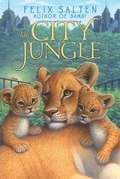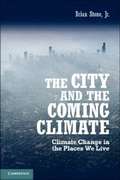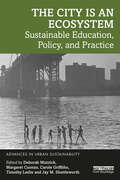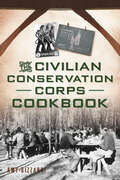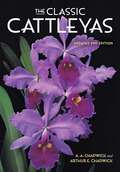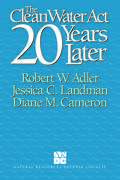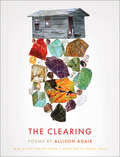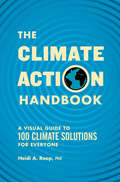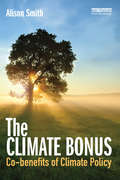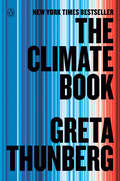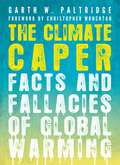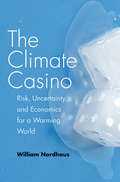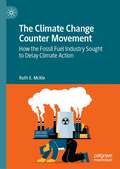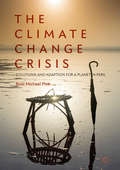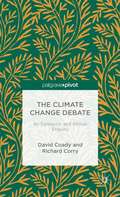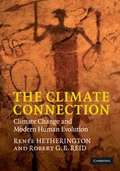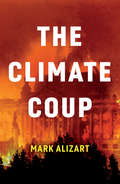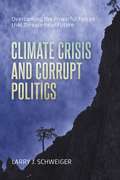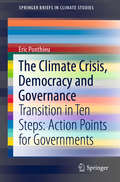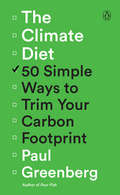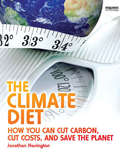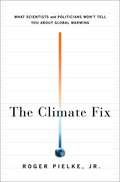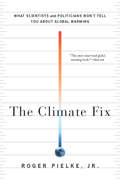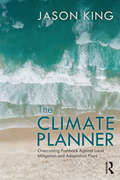- Table View
- List View
The City Jungle
by Felix Salten Whittaker ChambersGet to know the lives and longings of animals in a city zoo in this time-honored tale from the author of Bambi.The animals of the city zoo miss their homes. While they appreciate the company of one another, they have a fierce longing to be free of the daily visitors, the city sounds--and most of all, the bars to their cages. Vasta the mouse is the only animal who is not behind bars. She uses her freedom to travel from cage to cage, visiting Yppa the orangutan and her young son Tikki, Hella the proud lioness and her two cubs, Mino the crazy fox, Pardinos the friendly elephant, and Hallo the tame wolf. The zookeepers and visitors have no idea what life is really like in this city jungle, but Felix Salten's depiction of these animals' stories is brought vividly to life in this beautiful repackage.
The City and the Coming Climate: Climate Change and the Places We Live
by Brian Stone Jr.This book is the first to explore the dramatic amplification of global warming underway in cities and the range of actions that individuals and governments can undertake to slow the pace of warming. A core thesis of the book is that the principal strategy currently advocated to mitigate climate change - the reduction of greenhouse gases - will not prove sufficient to measurably slow the rapid pace of warming in urban environments. Brian Stone explains the science of climate change in terms accessible to the nonscientist and with compelling anecdotes drawn from history and current events. The book is an ideal introduction to climate change and cities for students, policy makers, and anyone who wishes to gain insight into an issue critical to the future of our cities and the people who live in them.
The City is an Ecosystem: Sustainable Education, Policy, and Practice (Advances in Urban Sustainability)
by Margaret Cuonzo Deborah Mutnick Carole Griffiths Timothy Leslie Jay M. ShuttleworthThe City is an Ecosystem maps an interdisciplinary, community-engaged response to the great ecological crises of our time—climate change, biodiversity loss, and social inequality—which pose particular challenges for cities, where more than half the world’s population currently live. Across more than twenty chapters, the three parts of the book cover historical and scientific perspectives on the city as an ecosystem; human rights to the city in relation to urban sustainability; and the city as a sustainability classroom at all educational levels inside and outside formal classroom spaces. It argues that such efforts must be interdisciplinary and widespread to ensure an informed public and educated new generation are equipped to face an uncertain future, particularly relevant in the post-COVID-19 world. Gathering multiple interdisciplinary and community-engaged perspectives on these environmental crises, with contemporary and historical case study discussions, this timely volume cuts across the humanities and social and health sciences, and will be of interest to policymakers, urban ecologists, activists, built environment professionals, educators, and advanced students concerned with the future of our cities.
The Civilian Conservation Corps Cookbook
by Amy BizzarriThe Civilian Conservation Corps was a voluntary government work relief program that offered nearly 3 million unemployed, unmarried men the job of restoring and conserving America's public lands, forests and parks. The wages weren't the only draw--the program also threw in three square meals a day served in the camp mess hall. The Civilian Conservation Corps Cookbook features the recipes that sustained not only the CCC during the Great Depression but also our grandparents and great-grandparents. Budget friendly, with ingredients that can easily be found--if not in your very own pantry then at your local grocer--these recipes reflect the "make do" attitude of Depression-era home cooks.
The Classic Cattleyas
by A. A. Chadwick Arthur E. ChadwickIn 1818, William Cattley succeeded in flowering one of the first species of the genus that would bear his name. These first cattleyas are the classic cattleyas, whose form defined the essence of tropical orchids for generations to come. Indeed, the color of their flowers became known as "orchid." In this helpful and informative book, each classic Cattleya species is described in fascinating detail, and its role in breeding programs is elucidated. All that is required to appreciate and grow the large-flowered cattleyas successfully is included. Cultivation, humidity and watering, fertilizing, propagation, and diagnosing and treating problems are detailed, making this volume valuable for both veteran orchid enthusiasts and those who simply love these beautiful flowers.
The Clean Water Act 20 Years Later
by Robert W. Adler Diane M. Cameron Jessica C. LandmanThis volume explores the issues associated with the complex subject of water quality protection in an assessment of the successes and failures of the Clean Water Act over the past twenty years. In addition to examining traditional indicators of water quality, the authors consider how health concerns of the public have been addressed, and present a detailed examination of the ecological health of our waters. Taken together, these measures present a far more complete and balanced picture than raw water quality data alone.As well as reviewing past effectiveness, the book includes specific recommendations for the reauthorization of the Act, which is to be considered by Congress in 1995. This balanced and insightful account will surely shape the debate among legislative and policy experts and citizen activists at all levels who are concerned with issues of water quality.
The Clearing: Poems (Max Ritvo Poetry Prize Ser.)
by Allison AdairA poetry debut that&’s &“a lush, lyrical book about a world where women are meant to carry things to safety and men leave decisively&” (Henri Cole). Luminous and electric from the first line to the last, Allison Adair&’s debut collection navigates the ever-shifting poles of violence and vulnerability with a singular incisiveness and a rich imagination. The women in these poems live in places that have been excavated for gold and precious ores, and they understand the nature of being hollowed out. From the midst of the Civil War to our current era, Adair charts fairy tales that are painfully familiar, never forgetting that violence is often accompanied by tenderness. Here we wonder, &“What if this time instead of crumbs the girl drops / teeth, her own, what else does she have&”?The Clearing knows the dirt beneath our nails, both alone and as a country, and pries it gently loose until we remember something of who we are, &“from before . . . from a similar injury or kiss.&” There is a dark beauty in this work, and Adair is a skilled stenographer of the silences around which we orbit. Described by Henri Cole as &“haunting and dirt caked,&” her unromantic poems of girlhood, nature, and family linger with an uncommon, unsettling resonance.Winner of the 2019 Max Ritvo Poetry PrizePraise for The Clearing &“A dark and bodily nod to folk- and fairy-tale energy.&” —Boston Globe &“The poems in Adair&’s debut draw on folklore and the animal world to assert feminist viewpoints and mortal terror in lush musical lines, as when &“A fat speckled spider sharpens / in the shoe of someone you need.&” —New York Times Book Review, &“New & Noteworthy Poetry&” &“Like Grimms&’ fairy tales, Adair&’s poems are dark without being bleak, hopeless, or disturbing. Readers will find the collections lush language and provocative imagery powerfully resonant.&” —Publishers Weekly (Starred Review)
The Climate Action Handbook: A Visual Guide to 100 Climate Solutions for Everyone
by Heidi RoopThis must-have book shows us WHY we need to take action now to combat climate change and then, critically, HOW, through easy-to-understand language and fascinating infographics that offer each of us varied and doable solutions to the overwhelming challenges facing our planet. As more focus is put on climate science, there is a need for each of us to learn how we can change our habits in our home, communities, and government to save our planet. Enter The Climate Action Handbook. A visually stunning guide, it does what no other climate change book manages to do: it's approachable, digestible, and offers the average person ideas, options, and a roadmap for action. It also offers hope—often overlooked in climate change conversations. Climate actions can create near-instantaneous improvements in air quality and can offer ways to address societal inequities, green our communities, save money, and build local economies. Stunning and creative infographics help anyone easily grasp the many challenges facing our planet, as well as how every action—be it on the individual, local, or government level—matters. From food and fashion choices, rethinking travel, greening up our homes and gardens, to civic engagement and championing community climate planning, Dr. Heidi Roop shares 100 wide-ranging ways that readers from all walks of life can help move the needle in the right direction. Actions include: • Cutting down on food waste • Reducing your driving speed • Voting in every election • Using the cold-water cycle on your washing machine • Supporting healthy soils in your gardens and community green spaces • Engaging in local climate action planning • Preparing an emergency kit for your home • Deleting unused emails and online accounts • Swapping out milk for nondairy alternatives like oat milk • Opting for slower shipping whenever possible • Regularly maintaining and clean your heating and cooling systems • Engaging in climate conversations at work and at home And many more!Return to this invaluable resource again and again to discover a roadmap for action and much-needed hope. What will your climate journey look like?
The Climate Bonus: Co-benefits of Climate Policy
by Alison SmithWe urgently need to transform to a low carbon society, yet our progress is painfully slow, in part because there is widespread public concern that this will require sacrifice and high costs. But this need not be the case. Many carbon reduction policies provide a range of additional benefits, from reduced air pollution and increased energy security to financial savings and healthier lifestyles, that can offset the costs of climate action. This book maps out the links between low carbon policies and their co-benefits, and shows how low carbon policies can lead to cleaner air and water, conservation of forests, more sustainable agriculture, less waste, safer and more secure energy, cost savings for households and businesses and a stronger and more stable economy. The book discusses the ways in which joined-up policies can help to maximise the synergies and minimise the conflicts between climate policy and other aspects of sustainability. Through rigorous analysis of the facts, the author presents well-reasoned and evidenced recommendations for policy-makers and all those with an interest in making a healthier and happier society. This book shows us how, instead of being paralysed by the threat of climate change, we can use it as a stimulus to escape from our dependence on polluting fossil fuels, and make the transition to a cleaner, safer and more sustainable future.
The Climate Book: The Facts and the Solutions
by Greta ThunbergA NEW YORK TIMES BESTSELLERWe still have time to change the world. From climate activist Greta Thunberg, comes the essential handbook for making it happen.You might think it's an impossible task: secure a safe future for life on Earth, at a scale and speed never seen, against all the odds. There is hope—but only if we listen to the science before it's too late.In The Climate Book, Greta Thunberg has gathered the wisdom of over one hundred experts—geophysicists, oceanographers and meteorologists; engineers, economists and mathematicians; historians, philosophers and Indigenous leaders—to equip us all with the knowledge we need to combat climate disaster. Throughout, illuminating and often shocking grayscale charts, graphs, diagrams, photographs, and illustrations underscore their research and their arguments. Alongside them, she shares her own stories of demonstrating and uncovering greenwashing around the world, revealing how much we have been kept in the dark. This is one of our biggest challenges, she shows, but also our greatest source of hope. Once we are given the full picture, how can we not act? And if a schoolchild's strike could ignite a global protest, what could we do collectively if we tried?We are alive at the most decisive time in the history of humanity. Together, we can do the seemingly impossible. But it has to be us, and it has to be now.
The Climate Caper: Facts and Fallacies of Global Warming
by Garth W. PaltridgeSo you think the theory of disastrous climate change has been proven? You believe scientists are united in their efforts to affect a reduction in carbon emissions? You trust that scientists are far too professional to overstate their case? Maybe we should all think again. In The Climate Caper, written with a light touch and a readable manner, Garth Paltridge shows that the case for action against climate change is not nearly so clear cut after all. He leads us through the inherent problems of the climate modeling process, as well as the uncertainties associated with economic forecasts of climatic doom. Paltridge uncovers the conscious and subconscious forces that hide skepticism within the scientific community from the public eye and submit governments to a scientific and technological elite-an elite that achieves its ends by manipulating the public through fear of climate change, creating the world's greatest example of a religion for the politically correct.
The Climate Casino
by William D. NordhausClimate change is profoundly altering our world in ways that pose major risks to human societies and natural systems. We have entered the Climate Casino and are rolling the global-warming dice, warns economist William Nordhaus. But there is still time to turn around and walk back out of the casino, and in this essential book the author explains how. Bringing together all the important issues surrounding the climate debate, Nordhaus describes the science, economics, and politics involved--and the steps necessary to reduce the perils of global warming. Using language accessible to any concerned citizen and taking care to present different points of view fairly, he discusses the problem from start to finish: from the beginning, where warming originates in our personal energy use, to the end, where societies employ regulations or taxes or subsidies to slow the emissions of gases responsible for climate change. Nordhaus offers a new analysis of why earlier policies, such as the Kyoto Protocol, failed to slow carbon dioxide emissions, how new approaches can succeed, and which policy tools will most effectively reduce emissions. In short, he clarifies a defining problem of our times and lays out the next critical steps for slowing the trajectory of global warming.
The Climate Change Counter Movement: How the Fossil Fuel Industry Sought to Delay Climate Action
by Ruth E. McKieThis book provides an historical account of the emergence and spread of the climate change counter movement across the globe. Drawing on an extensive database developed by the author, the book recounts the development of an international network, taking the reader on a journey through the history of the movement before looking closely at a series of comparative case studies examining movement organisations in different countries.
The Climate Change Crisis: Solutions And Adaption For A Planet In Peril
by Ross Michael PinkThis book explores how the world community will respond to the unfolding humanitarian crisis caused by climate change. It recognises climate change as the greatest threat to human development in the 21st century, bringing with it: flooding, drought, extreme temperatures, health crises, threats to human security and severe harm to economic development.The Climate Change Crisis addresses climate change and its impact as a major threat for countries around the world. Through a collection of interviews with leading environmentalists and exploration into new innovations that can offer hope and protection for billions of people, this book presents an interdisciplinary approach towards understanding the paramount health and development challenges of climate change.This timely and informative book cuts across several disciplines, including human rights, public policy, international relations, national refugee policy, and migration studies.
The Climate Change Debate: An Epistemic and Ethical Enquiry
by David Coady Richard CorryOf the two kinds of philosophical questions - epistemic and ethical - raised by the public debate about climate change, professional philosophers have dealt almost exclusively with the ethical. This book is the first to address both and examine the relationship between them.
The Climate Connection: Climate Change and Modern Human Evolution
by Renée Hetherington Robert G. B. ReidAnalysis of climate change and human evolution, migration and behavioural change and implications for our future.
The Climate Coup
by Mark AlizartInaction by governments in the face of climate change is often attributed to a lack of political will or a denial of the seriousness of the situation, but as Mark Alizart argues in this provocative book, we shouldn’t exclude the possibility that part of the reluctance might be motivated by cynicism and even sheer evil: for some people, there are real financial and political benefits to be gained from the chaos that will ensue from environmental disaster. The climate crisis creates its winners – individuals who orchestrate environmental chaos and bet on the collapse of the world as they bet on declining share values. In the face of this veritable ‘carbofascist’ coup targeting humanity, modifying our behaviour as individuals won’t suffice. We must train our critical attention on those financial and political actors who speculate on catastrophe and, in the light of this, we must rethink the strategy of ecological activism. This is a war to win, not a crisis to overcome.
The Climate Crisis
by David Archer Stefan RahmstorfMost climate scientists wholeheartedly agree with the above statement by the US President. An incredible wealth of scientific data on global warming has been collected in the last few decades. The history of the Earth's climate has been probed by drilling into the polar ice sheets and the sediment layers of the oceans' vast depths. Great advances have been made in computer modeling of our climate. Each year, over 10,000 scientific papers are published containing the key word "climate".
The Climate Crisis and Corrupt Politics: Overcoming the Powerful Forces that Threaten our Future
by Larry J SchweigerThere is only one earth and our world is undergoing dramatic changes brought on by the climate crisis and other human-induced ecological disruptions. The world's top scientists studying these threats and the forces behind them have been warning us for dec
The Climate Crisis, Democracy and Governance: Transition in Ten Steps: Action Points for Governments (SpringerBriefs in Climate Studies)
by Eric PonthieuThis book argues that at a time when the world is facing environmental and social upheaval, the political establishment has been unwilling to listen and slow to act. This is reflected in a political system that has been incapable of rising to the challenge. Only by governments taking a radical and progressive lead in making changes – imposing them if necessary – can there be any hope of slowing, stopping and then reversing our global catastrophe. Governments hold the prime responsibility in the creation of a virtuous circle of positive action for the climate. Starting from a European perspective, a ten point manifesto explains how this can be done and how we can have hope for the future. The book is a call for action to European governments in the approach to COP26 and when plans for a European Green Deal are being discussed in the EU.Disclaimer: The author of this publication is acting in his own name. The viewpoints he defends are in no way reflecting the opinion of the European Economic and Social Committee and of other EU institutions.
The Climate Diet: 50 Simple Ways to Trim Your Carbon Footprint
by Paul GreenbergA celebrated writer on food and sustainability offers fifty straightforward, impactful rules for climate-friendly living"Some strong and rational suggestions for reducing your personal impact here--and when you're eating smart, you'll have the energy to do the movement building we need to change systems too! This book integrates the individual and the societal in a powerful way."--Bill McKibbenWe all understand just how dire the circumstances facing our planet are and that we all need to do our part to stem the tide of climate change. When we look in the mirror, we can admit that we desperately need to go on a climate diet. But the task of cutting down our carbon emissions feels overwhelming and the discipline required hard to summon. With The Climate Diet, award-winning food and environmental writer Paul Greenberg offers us the practical, accessible guide we all need. It contains fifty achievable steps we can take to live our daily lives in a way that's friendlier to the planet--from what we eat, how we live at home, how we travel, and how we lobby businesses and elected officials to do the right thing. Chock-full of simple yet revelatory guidance, The Climate Diet empowers us to cast aside feelings of helplessness and start making positive changes for the good of our planet.
The Climate Diet: How You Can Cut Carbon, Cut Costs, and Save the Planet
by Jonathan HarringtonThe atmosphere is getting fat on our carbon and other greenhouse gas emissions and it needs our help. We live in a world of excess, consuming too much of everything-food, clothes, cars, toys, shoes, bricks, and mortar. Our bingeing is often so extreme that it threatens our own health and wellbeing. And we are not the only ones who are getting sick. The Earth, which provides the food, air, water, and land that sustains us, is also under severe pressure. We either take steps to put our personal and planetary systems back into balance or we suffer the consequences. So, what does any unhealthy overweight person do when the doctor tells him or her that they are eating themselves into an early grave? Go on a diet! This is the must-have guide to the most important diet ever, explaining climate change concepts, problems, and solutions in ways that anyone can easily understand. Following a six-step climate diet plan, families will be able to count their carbon calories and learn how to reduce them, leaving us with a slim healthy planet now and for the future.
The Climate Fix: What Scientists and Politicians Won't Tell You About Global Warming
by Roger A. Pielke Jr.In The Climate Fix, Roger Pielke, Jr., a political scientist and a world-renowned expert on he intersection of politics and science, dissects the climate debate and diagnoses what has gone wrong and who's to blame for the mess. His answers will surprise you--it is the people who are best positioned to see clearly why we need to respond to climate change who are, more often than not, the people who get in the way of anything being accomplished. How is that possible? Quite simply, it's because most supporters of action on climate change, whether scientists, politicians, or activists, have gotten caught up in a vicious cycle. It begins with the belief that there is insufficient political will for action. Fixing this, it is assumed, requires that everyone agree on all aspects of climate change--both the dangers and the remedies. Accomplishing that means scaring people in the hope that fear will accomplish what reason has not. Fear often requires politicizing science, shaping its presentation in an effort to motivate a specific political outcome. But rather than making action more likely the posturing reinforces a state of inaction. Thus the cycle continues, and its malign influence can be felt in all quarters, from the halls of government and academia to the newspaper and your favorite dog. Pielke lays these problems bare for all to see. But he does more than just wag his finger. The Climate Fix presents first steps on a better path, one that returns to what really matters in the climate debate: expanding energy access (including for the 1.3 billion people worldwide who have none) and increasing energy security while lowering costs through technological innovation. Without those goals, Pielke argues, well never wean ourselves off carbon-heavy energy, whatever the hard-core environmentalists say. With them, we can not only help save our own lives but also improve everyone's, and turn a vicious cycle into a virtuous one. It is time to do something about climate change. We can keep trying to do it the old way, or we can try something new, something offensive to neither our livelihoods nor our common sense. The choice, even after years of muddy debate, should be clear. Which will you choose?
The Climate Fix: What Scientists and Politicians Won't Tell You About Global Warming
by Roger Pielke Jr.Why has the world been unable to address global warming? Science policy expert Roger Pielke, Jr., says it's not the fault of those who reject the Kyoto Protocol, but those who support it, and the magical thinking that the agreement represents. In The Climate Fix, Pielke offers a way to repair climate policy, shifting the debate away from meaningless targets and toward a revolution in how the world's economy is powered, while de-fanging the venomous politics surrounding the crisis. The debate on global warming has lost none of its power to polarize and provoke in a haze of partisan vitriol. The Climate Fix will bring something new to the discussions: a commonsense perspective and practical actions better than any offered so far.
The Climate Planner: Overcoming Pushback Against Local Mitigation and Adaptation Plans
by Jason KingThe Climate Planner is about overcoming the objections to climate change mitigation and adaption that urban planners face at a local level. It shows how to draft climate plans that encounter less resistance because they involve the public, stakeholders, and decisionmakers in a way that builds trust, creates consensus, and leads to implementation. Although focused on the local level, this book discusses climate basics such as carbon dioxide levels in the atmosphere, the Intergovernmental Panel on Climate Change, the Paris Agreement of 2015, worldwide energy generation forecasts, and other items of global concern in order to familiarize urban planners and citizen planners with key concepts that they will need to know in order to be able to host climate conversations at the local level. The many case studies from around the United States of America show how communities have encountered pushback and bridged the implementation gap, the gap between plan and reality, thanks to a commitment to substantive public engagement. The book is written for urban planners, local activists, journalists, elected or appointed representatives, and the average citizen worried about climate breakdown and interested in working to reshape the built environment.
